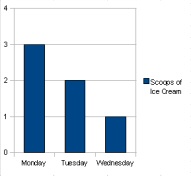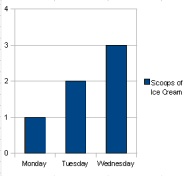The Extrapolation Assumption
Which would you rather have: 3 scoops of ice cream on Monday, 2 scoops on Tuesday, and 1 scoop on Wednesday, or the reverse, 1 scoop on Monday, 2 scoops on Tuesday, and 3 scoops on Wednesday?

|

|
Researchers who study intertemporal decision making (decisions involving a span of time) find that most people prefer the second case, with ascending rewards. Interestingly, this is not the purely rational choice. Receiving the extra ice cream earlier is slightly superior if the goal is maximum benefit, because there is some risk of interruption in the plan before Wednesday. For example, I could get hit by a bus, get sick, the ice cream supply could run out, etc.
One reason for our tendency to choose the ascending sequence is that we prefer to look forward to things getting better rather than dread things getting worse. (I know, dread is a strong word for ice cream, but I can’t think of a word that means mild dread. Word lovers, leave me a comment.)
But another reason for our irrational choice, one I didn’t guess, is that we tend to automatically and subconsciously extrapolate the trend into the future. We include in our mental calculation some assumption that we might get 4 scoops on Thursday in the ascending sequence, and 0 scoops on Thursday in the descending sequence.
I suppose this mental habit is often useful, since many trends do continue into the future. But this mental habit of making decisions based on the assumption that the observed trend will continue also leads to things like economy-destabilizing housing bubbles and bad business decisions. When data is available to rationally evaluate the probability that the trend will continue, be aware of the subconscious tendency to assume, and take a look at the data.
